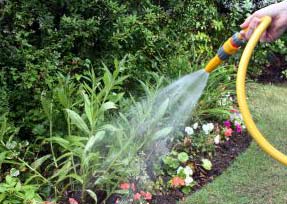Soil quality and its water retention capability, regional location and climate, topography of the landscape, exposure to the sun, wind, shade, frequency and amount of rainfall, and nearby reflecting surfaces are some of the factors that determine the design and layout of a garden. Once that has been determined, eco friendly organic compost from recycled kitchen waste can be used to supply nutrients to the soil. Using mulch in the garden discourages weeds, prevents loss of water through evaporation and enriches the soil.
Choose plants keeping in mind the local climate and soil conditions. Arrange plants with similar water requirements together. Mature plants require less water as they have a well developed root system. Plants that transpire less or don’t lose much water by evaporation need less water.
-
Rainwater from the roof can be stored in rainwater tanks and used later to water the garden.
-
Water early in the morning or after sunset so that there is no loss due to evaporation.
-
If water forms puddles as you water from the hose, swing the hose to another side or wait till the water is absorbed before starting again, to prevent wasteful run-offs.
-
Tightly packed dry soil will not allow water to penetrate. Loosen up the soil before watering.
-
Recycled gray-water or waste water from baths, showers or washing machines can be used for watering the plants.
-
If you are undecided about investing in a drip irrigation system, try using a soaker hose in the garden to see the results of focused watering. Soaker hoses connected to a water source are perforated rubber hoses wrapped in fabric that leech out water to the roots of plants
Drip Irrigation
-
Using drip irrigation instead of a watering hose conserves water and reduces water wastage through evaporation, over-run and soil erosion as well. In this method, the water spray is not affected by strong winds; it drips directly to the roots of plants in the soil, and not to the weeds. It also prevents insect and fungal infections as the leaves do not get wet.
-
PVC tubes of various diameters based on the desired water pressure are placed below or above the soil or under the mulch.
-
Water flow can be managed by having controllers such as a timer to determine when to let the water flow through the irrigation system.
-
Drip emitters fixed to the irrigation pipes ensure a steady flow of water to your plants.
-
When the preset moisture level in the soil dips, soil moisture sensors beneath the soil trigger the irrigation controller to start the water flow.
-
Rain switches off the irrigation system. This saves water and money.
-
A backflow prevention device prevents fertilizers and other unwanted chemicals in the soil from getting into the pipes when there is reverse water pressure.
...Read more
Close










